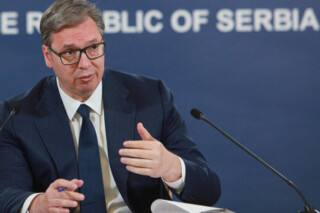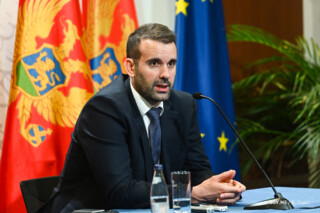Serbian officials’ statements related to Montenegro are unacceptable, unnecessary and harmful for Montenegro, but primarily, they are harmful for Serbia, Mr Miodrag Vuković, DPS member, has said.
Commenting on the statements of the Serbian president and Serbia’s head of diplomacy on the persecuting Serbs in Montenegro, Mr Vuković said that Montenegro “doesn’t find itself in the remarks of the holders of the official politics in Serbia”.
“Montenegro isn’t the country of chaos, and it is not on the brink of the fratricidal war. Not even any individual in Montenegro is being persecuted, let alone Serbian national community. There’s not even tendency to make somebody disappear”, Mr Vuković said.
He said it was just Serbia’s meddling in Montenegro’s internal affairs which has certain historical, modern and future messages.
“It is a narrative which is at the core of every politics in relation to not only Montenegro but to the surroundings too. Great-Serbian narratives inflict damage to everybody”, Mr Vuković said.
He adds that such statements don’t come from Croatia, Bosnia, Kosovo, Macedonia.
“They have been coming from a center of political Belgrade for a while”, Mr Vuković said.
According to him, Montenegro never meddles on Serbia’s internal affairs or any country’s internal affairs and wants to have good relations with everybody.
Commenting on the recent gatherings of the adherents of the Serbian Orthodox Church and pro-Serbian opposition in Montenegro despite the bans, Mr Vuković said “it has nothing to do with religion”.
“Professor Radovan Bigović’s warning confirms that religious processions are nothing more than the project of a great Serbian nationalism. Over 20 years ago, Professor Bigović said that Amfilohije’s Serbdom politics in Montenegro would backfire”, Mr Vuković said.
He pointed out that protests against the Law on Freedom of Religion were political reaction of one social subject in Montenegro which had stepped out of the authentic actions.
“A political rebellion emerged and it has nothing to do with religion. The law doesn’t touch orthodoxy. It is just the expectation that everybody should function within one closed, legally defined and legitimate state and social community. The church isn’t orthodoxy but an institution where an orthodox ritual is carried out. The attempt to swap theses is very obvious”, Mr Vuković said.
He added that Montenegrin independence, democratic orientation and anti-fascism “are being tested today”.
Asked if it is possible to resume the dialogue in a divided Montenegro, Mr Vuković said that the Parliament was an open institution where everybody could talk.
For a conversation, he said, it is necessary that the other side is willing to talk.
“Indira Gandhi said: “You can’t shake hands with a clenched fist”. Many have that clenched fist towards Montenegro. However, our hand is open”, Mr Vuković added.
Memory of the true euphoria of love for the then state
Mr Miodrag Vuković recalled the plea of Pobjeda, a memory of 39 years ago, the Day of the Youth, 25 May 1981, when as former president of the youth of Yugoslavia, was the first one to receive youth baton after Tito’s death.
“It’s part of the history now but also part of my deepest intimacy, memories of times when people took care of each other. I remember it was warm country, with great heart. I could pass night in Ljubljana and wake up in Skopje. I remember euphoria at the JNA Stadium, carrying love for the country. Nobody can take that from me”, Mr Vuković says.
He also remembers some other events from that period.
“Before that 25 May, I was appointed president of youth in Yugoslavia. I visited Kosovo and Vojvodina in January and February and I remember some warnings. Some had already played out the scenario for forthcoming days”, Mr Vuković recalls.
He remembered his stay in Vojvodina, when he found out about the demonstrations in Priština.




